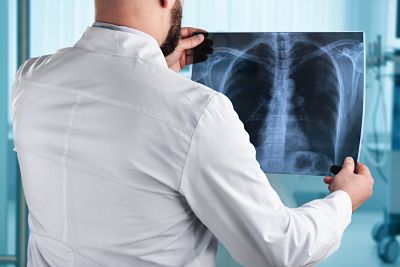WHAT IS PLEURAL EFFUSION?
Pleural effusion is a buildup of excess fluid between the layers of the pleura, or space between the lungs and chest wall. The pleural cavity or pleural space is made up of an outer layer (attached to the chest wall) and an inner layer (lining the outer surface of the lungs) of membranes that creates the pleural sac. Under normal conditions, there is a thin film of serous fluid within the pleural space that aids in the function of the lungs during breathing. In the case of pleural effusion, fluid builds up in the space between the layers of the pleura causing breathing difficulties.

WHAT CAUSES PLEURAL EFFUSION?
Pleural effusion is a buildup of excess fluid between the layers of the pleura, or space between the lungs and chest wall. The pleural cavity or pleural space is made up of an outer layer (attached to the chest wall) and an inner layer (lining the outer surface of the lungs) of membranes that creates the pleural sac. Under normal conditions, there is a thin film of serous fluid within the pleural space that aids in the function of the lungs during breathing. In the case of pleural effusion, fluid builds up in the space between the layers of the pleura causing breathing difficulties.
Pleural effusion is a secondary disorder, meaning that it is caused by or the result of an illness or another condition. Some common causes of the condition are:
- Liver or kidney disease – If your liver or kidneys are not working efficiently, fluid can build up in the body and leak into the chest causing pleural effusion
- Congestive heart failure is a condition that causes the heart to be unable to sufficiently pump blood to the organs and throughout the body. Congestive heart failure often causes a buildup of excess fluid in the pleural sac
- Autoimmune disorders such as lupus or rheumatoid arthritis can affect the function of the lungs and create problems with the pleura
- Infections – Undiagnosed pneumonia is the most common infection that causes fluid buildup in the pleural space
- Cancer – either lung cancer or any cancer that has spread to the lungs can cause pleural effusion
- Complication from medical procedures such as open heart surgery or any surgery involving the chest can trigger fluid buildup around the lungs
The doctors at Pulmonary Associates of Richmond are highly trained lung specialists and can diagnose and treat the root cause of pleural effusion.
WHAT ARE THE SYMPTOMS OF PLEURAL EFFUSION?
Depending on the amount and cause of excess fluid, symptoms can range for patients from mile to severe. Some common symptoms include:
- Shortness of breath especially when lying down
- Chest pain which can be sharp especially when breathing in deeply
- Fever
- Persistent dry, unproductive cough
- Inability to breathe deeply
It is important to seek medical attention if you are experiencing these symptoms, as the condition is unlikely to resolve on its own.
DIAGNOSING PLEURAL EFFUSION
As pleural effusion is a secondary condition to a primary illness or disease, your doctor will most likely order tests to determine the root cause of the excess fluid. First, your doctor will listen to your lungs with a stethoscope and tap on your chest to determine if there are any signs of fluid in the pleural sac. Your doctor may order an X-ray to help identify any excess fluid. The most accurate images come from a CT scan and offer the most help in determining the underlying cause..
TREATING PLEURAL EFFUSION
Pleural effusion can be a life threatening condition that needs immediate medical attention. For severe or chronic cases, your doctor will drain the fluid from the pleural sac to relieve the pressure on the lungs and help alleviate the symptoms of pleural effusion. There are several ways to drain the fluid that range from temporary to more permanent methods, including:
- Thoracentesis – using a small needle inserted into the area of effusion, your doctor will draw the fluid out of the pleura
- Tube thoracostomy, also known as a chest tube, places a temporary plastic tube into the chest cavity to allow any fluid build up to drain
- A pleural drain is a long-term catheter that is placed in the pleura to provide a continuous drain for excess fluid
These treatments are to relieve the immediate discomfort of excess buildup of fluid on the lungs. If the condition is caused by bacterial or viral pneumonia, antibiotics can help treat the illness causing the effusion. Medications called diuretics are used in patients with congestive heart failure to help the body eliminate excess fluid through the kidneys.


